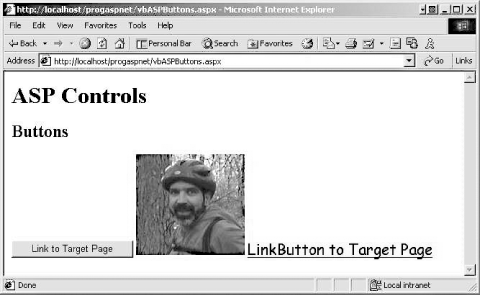5.4 Button Controls
| Buttons are controls that post the form back to the server, enabling server-side processing to commence. There are three types of button controls:
In addition to the properties, methods, and events inherited along with all the other ASP controls, all three button types have the following two events:
The code in Example 5-5 and Example 5-6 creates a web page containing three buttons, one of each type. Each button performs the same task: transferring control to another web page. Example 5-5 shows the C# code, and Example 5-6 shows the same code in VB.NET.
Example 5-5. Buttons in C#, csASPButtons.aspx<%@ Page Language="C#" %> <script runat="server"> void btnLink_Click(Object Source, EventArgs E) { Response.Redirect("//localhost/progaspnet/TargetPage.aspx"); } void imgLink_Click(Object Source, ImageClickEventArgs E) { Response.Redirect("//localhost/progaspnet/TargetPage.aspx"); } </script> <html> <body> <form runat="server"> <h1>ASP Controls</h1> <h2>Buttons</h2> <asp:button text="Link to Target Page" onClick="btnLink_Click" toolTip="Click here to go to Target Page." runat="server" /> <asp:imageButton imageURL="Dan at vernal pool.jpg " alternateText="Link to Target Page" onClick="imgLink_Click" toolTip="Click here to go to Target Page." runat="server" /> <asp:linkButton text="LinkButton to Target Page" onClick="btnLink_Click" Font-Name="Comic Sans MS Bold" Font-Size="16pt" toolTip="Click here to go to Target Page." runat="server" /> </form> </body> </html> Example 5-6. Buttons in VB.NET, vbASPButtons.aspx code<%@ Page Language="VB" %> <script runat="server"> Sub btnLink_Click(ByVal Sender as Object, _ ByVal e as EventArgs) Response.Redirect("//localhost/progaspnet/TargetPage.aspx") End Sub Sub imgLink_Click(ByVal Sender as Object, _ ByVal e as ImageClickEventArgs) Response.Redirect("//localhost/progaspnet/TargetPage.aspx") End Sub </script> <html> <body> <form runat="server"> <h1>ASP Controls</h1> <h2>Buttons</h2> <asp:button text="Link to Target Page" onClick="btnLink_Click" toolTip="Click here to go to Target Page." runat="server" /> <asp:imageButton imageURL=" Dan at vernal pool.jpg " alternateText="Link to Target Page" onClick="imgLink_Click" toolTip="Click here to go to Target Page." runat="server" /> <asp:linkButton text="LinkButton to Target Page" onClick="btnLink_Click" Font-Name="Comic Sans MS Bold" Font-Size="16pt" toolTip="Click here to go to Target Page." runat="server" /> </form> </body> </html> Figure 5-3. Button controls Figure 5-3 shows the web page that results from running the example code. The System.Web.UI.WebControls namespace offers three kinds of button-like ASP controls:
In addition, note that the event handler uses an ImageClickEventArgs event argument, which is slightly different than the event handlers for the Button and LinkButton controls.
This is readily apparent if you look at the source code from your browser resulting from Example 5-5 or Example 5-6, an excerpt of which is shown in Example 5-7. Remember, this source code is output by ASP.NET, not written by you. Example 5-7. Browser source segment from csASPButtons.aspx<input type="submit" name="btnLink" value="Link to Target Page" title="Click here to go to Target Page." /> <input type="image" name="imgLink" title="Click here to go to Target Page." src="/books/2/655/1/html/2//progaspnet/Dan at vernal pool.jpg" alt="Link to Target Page" border="0" /> <a title="Click here to go to Target Page." href="javascript:_ _ doPostBack('lnkLink','')" style="font-family:Comic Sans MS Bold;font-size:16pt;">Link to Target Page</a> <script language="javascript"> <!-- function _ _doPostBack(eventTarget, eventArgument) { var theform = document.ctrl0 theform._ _EVENTTARGET.value = eventTarget theform._ _EVENTARGUMENT.value = eventArgument theform.submit( ) } // --> </script> |
EAN: 2147483647
Pages: 156
